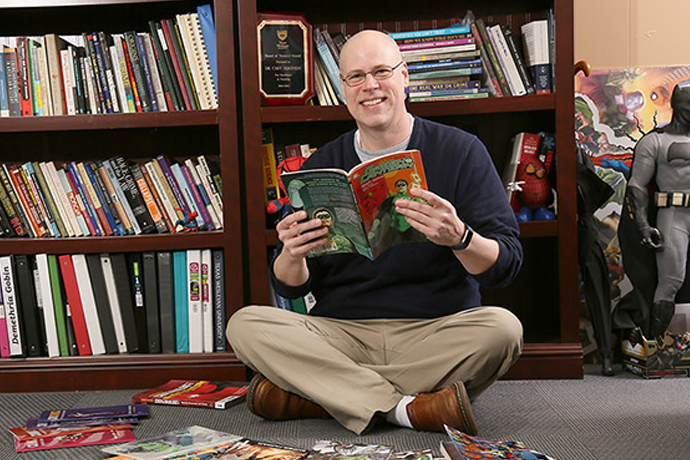Funny Business: Students Study Criminal Justice Through Comic Books

Since the dawn of man, stories of flawed heroes have taught us about good and evil, right and wrong, justice and retribution. Heroic figures define our moral and cultural boundaries and, like a mirror, reflect back our strengths and follies. And yes, it is a serious topic of academic study, with more than a dozen academic journals dedicated to comic books and graphic novels.
Future police officers and lawyers
Cary Adkinson, the associate professor of criminal justice who researches, writes and teaches about crime and comics, says superheroes are a natural fit for future police officers and lawyers. He frequently recites a Spider-Man maxim that runs through the comic book universe: With great power, comes great responsibility.
“Students going into these fields need a clear understanding of what they are getting into, and comics are a way to explore these concepts theoretically,” he says. “Superhero stories can reveal what we think about crime and justice.”
It’s fun too. For one assignment, they create a superhero persona for themselves, with a motto, name, origin story and power or abilities. Class discussions range from how their superpowers would fit into due process and privacy to law enforcement in the real world. They even make their own comics and videos.
History repeats itself
Comic books are a good way to sneak in some history as well. Modern superheroes emerged in the dark days of World War II (think Captain America, Wonder Woman, Superman) and they were not for children. They were mostly busy saving the world from fascism and the Nazis.
During the 1960s, heroes who espoused tolerance and acceptance appeared, such as the Fantastic Four, Spider-Man and Iron Man. They saved the little guy from evils closer to home, more like law enforcement than a military assault.
“All these characters reflected the deeper concerns of the time,” Adkinson says. “But one truism in criminal justice and sociology is that social and cultural behavior are cyclical. So we are still dealing with these same things.”
Bringing light to the world through criminal justice studies
He wants students to understand how their point of view is affected by history and social influences, to think about heroic culture and discover their own superhero.
“As faculty we really, really care about students going out into the world and doing positive things and helping people,” he says.
It’s an important part of the Texas Wesleyan way, he adds, to get students excited about coming to class, to look more deeply into things they may not have thought about: Am I a good person, do I have a good heart, am I sensitive to moral complexities in the world and willing to act with understanding of my behavior?
“We want them to bring some light into the world. That’s what superheroes do.”
Want to learn more about Dr. Adkinson or the criminal justice major at Texas Wesleyan? Visit the criminal justice homepage and download a sample degree plan today.








